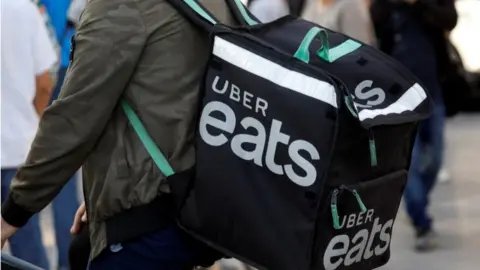Uber shares tumble as profit figures disappoint Wall Street
 Reuters
ReutersUber's shares went into reverse on Thursday after the taxi-hailing company unveiled profit figures that failed to live up to expectations.
Revenue growth slowed in face of heavy competition, leading to the company posting its largest quarterly loss.
Uber and its rivals are spending heavily to expand, but boss Dara Khosrowshahi said that the competitive pressures are easing.
But that didn't stop Uber's share price tumbling 13% in after-hours trading.
On Wednesday, rival Lyft reported figures that were generally welcomed on Wall Street, and there was an expectation that Uber would also post positive numbers.
But Uber's loss widened to $5.2bn (£4.3bn) in the three months to 30 June, from $878m in the quarter last year. The figures reflected $3.9bn of share-based compensation expenses related to its stock market listing earlier this year.
Total revenue rose 14.4% to $3.2bn, but fell short of average analysts' estimates of $3.4bn. Uber's costs rose 147% to $8.7bn in the quarter, including a sharp rise in spending for research and development.
Mr Khosrowshahi said the competitive environment is starting to rationalise and had been "progressively improving" since the first quarter. While the company continues to invest aggressively, it is expected to spend less on promotions and incentives to win market share.
Uber and Lyft have historically relied on subsidies to attract riders, and have been spending heavily to expand into areas such as self-driving technology and food delivery.
Uber, which admitted ahead of its Wall Street listing that it may never make a profit, is trying to convince investors that growth will come not only from its ride services, but also from other logistics and food delivery services.
Gross bookings, a measure of total value of rides before driver costs and other expenses, rose 31% from 2018 to $15.76bn, below analysts' forecasts of about $15.8bn.
The number of monthly active users rose to 99 million globally, from 93 million at the end of the first quarter and 76 million a year earlier.

Analysis by Michelle Fleury, New York business correspondent
"Uber has turned into the magical money burning machine." That's how Publicis Sapient analyst Alyssa Altman described Uber's second quarter results. The damning words go to the heart of the company's challenge: can Uber find a way to be profitable?
Its latest set of results failed to assuage sceptical investors and they gave the stock the cold shoulder. It doesn't help that its rival, Lyft, suggested on Wednesday that it could achieve profitability sooner than expected.
Traditionally Uber and Lyft have spent heavily on promotions to attract riders and win market share. Both companies have said that price pressure is easing. And yet Uber's costs still rose an astonishing 147%.
The chief executive, Dara Khosrowshahi, is betting that future growth will come not just from ride services, but from other businesses like food delivery. The signs are that he has clearly not yet convinced investors.
For Wall Street, these numbers on Thursday show this is still a company stuck in traffic.

